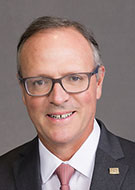RSNA Global Learning Center to Open in Mumbai
Curriculum planning will focus on breast and body imaging with an emphasis on gynecologic oncology





The next RSNA Global Learning Center (GLC) will be hosted by Tata Memorial Hospital (TMH) in Mumbai, India. TMH becomes the latest partner in RSNA’s GLC program, which collaborates with established radiology departments in low- and middle-resource countries to provide ongoing education, to improve patient care and expand access to advanced imaging technology.
A premier cancer care institution that serves as the nucleus of India’s National Cancer Grid, TMH connects more than 350 cancer hospitals across the country. “Through this extensive network, the GLC planned program has the potential to disseminate RSNA’s educational mission and strengthen radiology training throughout India,” said C.S. Pramesh, MS, FRCS, director of TMH and convenor of the National Cancer Grid.
“RSNA is delighted to partner with Tata Memorial Hospital as our next Global Learning Center,” said Jorge A. Soto, MD, RSNA Board liaison for international affairs. “TMH will be a strategic partner for RSNA. With its vast national network and commitment to cancer care and education, this collaboration will enable us to increase radiology training and exposure to the specialty in the region.”
“This partnership marks a significant opportunity to collaborate with the most renowned radiology society across the globe to empower service, education and research,” said Suyash Kulkarni, DMRD, DNB, professor and head of the Department of Radiology at TMH.
“We wish to leverage the education imparted and exchanged beyond our institute, to benefit cancer hospitals and national radiology subspecialty societies at a country-wide level,” added Sudeep Gupta, MBBS, MD, DM, director of the Tata Memorial Centre.
Addressing Challenges and Strengthening Capacity
“This GLC represents a deeper engagement between RSNA and the radiology community in India,” Dr. Soto said. “India has long been a key partner for RSNA, and this collaboration is an opportunity to further connect with India’s radiologists whose expertise and commitment have been integral to RSNA’s mission.”
Palak Bhavesh Thakkar, MBBS, DNB, a professor in the Department of Radiodiagnosis and officer in charge of breast imaging and interventions at TMH will serve as the onsite program director for the new GLC.
The educational offering will focus on breast and body imaging, with an emphasis on gynecologic oncology. Under Dr. Thakkar’s leadership, the initiative will include specific efforts to promote breast cancer screening awareness for high-risk populations and to enhance technology-driven research in imaging.

TMH manages exceptionally high patient volumes that create resource constraints in advanced imaging. The radiology department operates around the clock, yet demand continues to exceed capacity.
“Strengthening and implementing abbreviated protocols, along with strategic use of software and AI tools, could help reduce wait times and improve throughput,” Dr. Kulkarni said.
“Expanding access to early detection of breast cancer remains a national priority, particularly for women at high risk who face barriers to surveillance,” Dr. Thakkar said. “Opportunities for research funding to evaluate lower-cost contrast-enhanced mammography, versus abbreviated MRI, could help improve compliance and access to care.”
Targeted support for refining interventional imaging techniques is another priority. The institution also seeks to strengthen data management and audit processes, including establishing BI-RADS auditing, which Dr. Thakkar noted, is currently lacking across India. “These efforts align with TMH’s plans to advance research protocol development and implementation,” she added.
Additional opportunities may include reinforcement of MRI safety protocol standards and training enhancements in breast MRI acquisition, as well as abdominal, musculoskeletal and spinal MRI.
Dr. Thakkar plans to leverage existing partnerships to further amplify the program’s national reach. “We wish to disseminate the education effort to the National Cancer Grid, the Breast Imaging Society of India and the Society of Gynecological Imaging and Interventions,” she said.
Volunteers Needed for Onsite Training
RSNA is seeking volunteer faculty to support the GLC in Mumbai. Over a three-year period, RSNA members will collaborate closely with TMH faculty to develop a tailored curriculum and deliver education through lectures, hands-on workshops and virtual learning opportunities.
Radiologists with special interest in breast imaging, body imaging and gynecologic oncology are especially encouraged to apply. Faculty members will travel to Mumbai to collaborate with the onsite team, assess educational needs and deliver targeted training sessions.
The RSNA GLC program, launched in 2019 at Stellenbosch University in South Africa, has since partnered with radiology departments in Tanzania, Ecuador, Indonesia, Armenia and Peru.
For More Information
Interested applicants should email international@rsna.org for more details.
Learn more about RSNA Global Learning Centers.